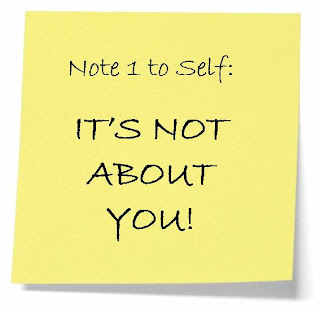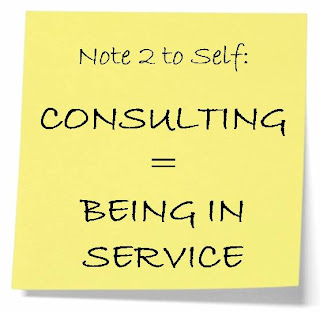In my career as a management consultant I have met all kinds of colleagues that I envy and admire for their charisma, their wit, their smartness or their marvelous rhetoric. Nevertheless I recently found out that all the things that make us great consultants, smart and intelligent, fast and proactive, are holding us back from achieving excellence.
 It all became clear to me when I witnessed another consultant on my project literally taking over from the customer as the big rescuer. The guy is a fast thinker, a sociable person, a perfect speaker and very loyal to the customer. But this time it felt wrong and it revealed a trait that – until then – has been a blind spot for me: my big rescuer-consultant ego.
It all became clear to me when I witnessed another consultant on my project literally taking over from the customer as the big rescuer. The guy is a fast thinker, a sociable person, a perfect speaker and very loyal to the customer. But this time it felt wrong and it revealed a trait that – until then – has been a blind spot for me: my big rescuer-consultant ego.
Needles to say that consultants are not cheap and that we are engaged in order to get results in a limited amount of time. Second, I have never been hired in a situation where there was no problem. My customer’s problems is how I make a living. So rescuing seems like a good option: getting in, solving the problem, documenting what you have done, transferring your knowledge and getting out. In consultant speak it is called effective use of the customer’s time and money.
The Ego Trap
Now, don’t get me wrong: getting our point across flawlessly is an absolute must-have skill for any consultant. However, most of us crash and burn when it comes to finishing the job. In the flow of the adrenalin and other boosting hormones that is caused by positive feedback on our rethoric and initiatives we take, we forget that we are there in service of the customer. Instead of being in service, our ego takes over, we become the star of the play, collect the flowers and the compliments, send a big fat invoice and head off to another customer.
Until now I would have said “Nothing wrong with that”. But the incident of my colleague made me acknowledge how often we are killing actors on stage. Let me explain. Solving the problem is only half of the work. The hardest part is to make sure that you stay in the background as the director of the movie and the real actor – your customer – is the one on stage solving the problem. Climbing on stage yourself and solving the problem may be nice but the customer did not learn anything and he or she is even more dependent on you for further developments.
Strangely, before I started in this profession, I thought that the stage work and the preparation to get on stage were the most essential part of the job. After some years of experience I know that there is still stage work involved, but that my place is in the chair of the play director. On stage is the customer and any intervention on my behalf in front of his/her peers only makes the customer weaker and my ego stronger (that’s how we end up with such a high percentage of arrogance in our sector).
The Humble Consultant
 What happens when the consultant leaves? The customer has a great solution, you’ve been taking the punches and darn right you deserved that money! However, your customer does not ‘own’ the solution as in: being representative for the solution. There can only be one individual representative for the solution. But we are smart and we design our game so subtle that the customer gets more time to spend on day-to-day business, while you as an expert work independently to solve the problem. What’s more, you have talent and experience beyond measures in this specific topic so you offer a solution that could never been achieved by the customer, even if he/she spent the same amount of time as you did.
What happens when the consultant leaves? The customer has a great solution, you’ve been taking the punches and darn right you deserved that money! However, your customer does not ‘own’ the solution as in: being representative for the solution. There can only be one individual representative for the solution. But we are smart and we design our game so subtle that the customer gets more time to spend on day-to-day business, while you as an expert work independently to solve the problem. What’s more, you have talent and experience beyond measures in this specific topic so you offer a solution that could never been achieved by the customer, even if he/she spent the same amount of time as you did.
We all know the saying “Give a man a fish and he will eat for a day. Teach him how to fish and he will eat forever”. I am convinced that the real consulting of this type is the road less traveled. But saying that customers demand to be serviced on a rescuer basis is a bad excuse for assuring our recurring business.
Being in service of the customer really means directing the play in such a way that he/she solves the problem and that you are in the background as a coach or a play director. That, of course, involves consulting skills of a higher level: knowing when to stop being intelligent, charismatic and know-it-all. The most important of all consulting skills is never taught in any available course : backing off and shutting up.


Pingback: Luc’s Thoughts on Organizational Change » Blog Archive » Music and Management Consulting()
Pingback: How to Suffer as a Consultant | Reply-MC()